by Gary Lord
Home - Genesis - 2007 - 2008 - 2009 - Early 2010 - Mid 2010 - Late 2010 - End 2010 - Early 2011 - Mid 2011 - Late 2011 - End 2011 - Early 2012 - Late 2012 - Early 2013- Late 2013 - 2014 - 2015 - Early 2016 - Late 2016 - 2017-19
Chapter Fifteen: Early 2013
Death of Aaron Swartz
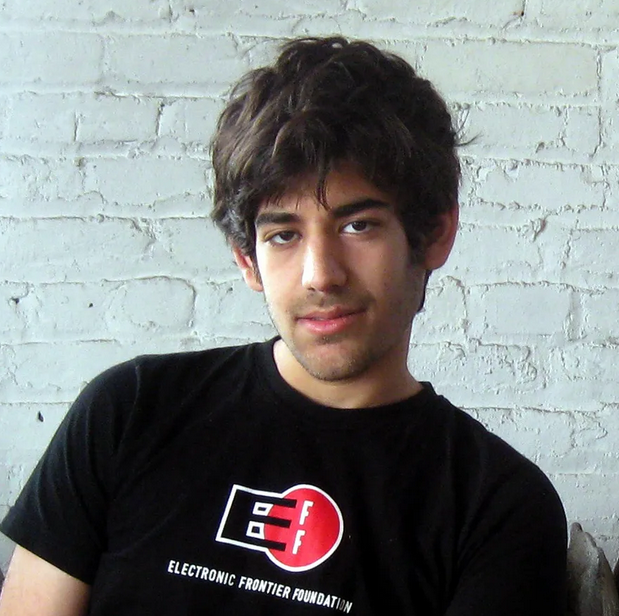
On 11 January 2013 Aaron Swartz, a prolific Internet activist, committed suicide by hanging himself in his Brooklyn apartment. He was only 26 years old.
Swartz had made significant contributions to a long list of enduring online projects including RSS, Markdown, Creative Commons and Reddit. He was the author of the Guerilla Manifesto, which called for anyone with access to valuable information to liberate it and make it available free online to everyone, rather than leaving businesses and academic organizations to profit by restricting access to wealthy subscribers.
There is no justice in following unjust laws. It’s time to come into the light and, in the grand tradition of civil disobedience, declare our opposition to this private theft of public culture.
We need to take information, wherever it is stored, make our copies and share them with the world. We need to take stuff that’s out of copyright and add it to the archive. We need to buy secret databases and put them on the Web. We need to download scientific journals and upload them to file sharing networks. We need to fight for Guerilla Open Access.
With enough of us, around the world, we’ll not just send a strong message opposing the privatization of knowledge — we’ll make it a thing of the past. Will you join us?
In January 2011 Swartz was arrested after he used a guest password, issued to him by the Massachusetts Institute of Technology (MIT), to download hundreds of academic journal articles from the JSTOR system. Video evidence showed Swartz accessing an MIT network computer in an unlocked closet and transferring data to a hard drive. He was initially charged with breaking and entering, even though the closet was open, and then unauthorized access to a computer network, even though he had a guest login. Further charges kept coming.
Swartz quickly found himself embroiled in a highy politicized legal case that escalated to absurd levels, with federal prosecutors adding multiple new felony charges and demanding he face up to 50 years in prison and $1 million in fines.
JSTOR only showed up because it was subpoenaed and if anyone’s the "victim" here, it would be JSTOR. MIT has remained silent on the whole issue. So, either someone’s got a deeper interest in this case than they’re willing to admit publicly, or the feds found someone with enough "hacking" activity under their belt that they feel comfortable turning the defendant into an "example."
Following his death, Aaron’s parents issued a statement praising his achievements and condemning those whose persecution and lack of support drove him to his death:
Aaron’s commitment to social justice was profound, and defined his life. He was instrumental to the defeat of an Internet censorship bill; he fought for a more democratic, open, and accountable political system; and he helped to create, build, and preserve a dizzying range of scholarly projects that extended the scope and accessibility of human knowledge. He used his prodigious skills as a programmer and technologist not to enrich himself but to make the Internet and the world a fairer, better place. His deeply humane writing touched minds and hearts across generations and continents. He earned the friendship of thousands and the respect and support of millions more.
Aaron’s death is not simply a personal tragedy. It is the product of a criminal justice system rife with intimidation and prosecutorial overreach. Decisions made by officials in the Massachusetts U.S. Attorney’s office and at MIT contributed to his death. The US Attorney’s office pursued an exceptionally harsh array of charges, carrying potentially over 30 years in prison, to punish an alleged crime that had no victims. Meanwhile, unlike JSTOR, MIT refused to stand up for Aaron and its own community’s most cherished principles.
At Swartz’s funeral, his father flatly stated that his son "was killed by the government". Over 250,000 people signed a White House petition demanding that the prosecutor in his case should be fired.
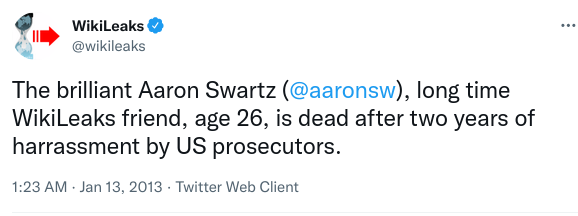
On 19 January 2013 WikiLeaks decided - due to "an investigation into the Secret Service’s involvement with Aaron Swartz" - to reveal that Swartz had helped WikiLeaks, had been in communication with Julian Assange, and "we have strong reasons to believe, but cannot prove, that Aaron Swartz was a WikiLeaks source." Swartz had also filed FOIA requests for information on Bradley Manning, leading to speculation that his prosecution had only escalated to such absurd heights because the WikiLeaks Grand Jury had become involved.
The MIT campus is located between Cambridge and downtown Boston, where Chelsea Manning used to meet her former boyfriend, and where she first met David House, an MIT researcher who was subpoenaed by the WikiLeaks Grand Jury in June 2011 (see Chapter Ten).
In December of 2010, while his downloads of academic papers from JSTOR was proceeding and the government was separately investigating Manning and Wikileaks, Swartz filed a series of Freedom of Information Act (FOIA) requests seeking documentation of Manning’s treatment while in custody. One of these requests, which was for a tape of a jailhouse conversation between House and Manning, required Swartz to obtain and provide a privacy waiver from House, which he did.
Obviously WikiLeaks prosecutors would have been hugely interested in such connections, and newspaper articles often quoted anonymous US officials speculating about Assange or Manning getting "support" from others in the Cambridge-Boston area.
*
"We Steal Secrets"
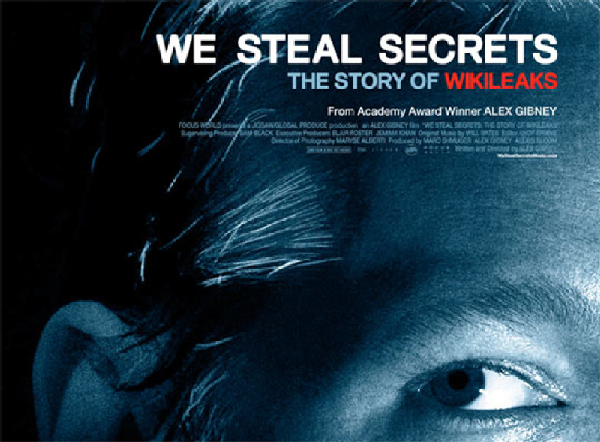
In late January 2013 a new movie, "We Steal Secrets: The WikiLeaks Story", premiered at the Sundance film festival in California. WikiLeaks staff had refused to participate in the movie, claiming that even the name was biased.

The film’s executive producer, socialite Jemima Khan (later reverting to her wealthy family surname Jemima Goldsmith), who had helped post bail money for Assange in 2010, had by then become heavily influenced by his many critics. She argued that the title was actually a (mis)quote from former CIA director Michael Hayden, who had told producer Alex Gibney that the USA was in the business of "stealing secrets" from other nations. She thought it was ironic that "Manning may be put to death by his own government for doing the very thing to which Hayden so candidly admits." But it was NOT the same thing at all, and Assange was not having a bar of it. He asked why the film wasn’t instead called "We Steal Secrets: The CIA Story"?
The timing of the hostile film’s late May opening, just ten days before Manning’s 12-week trial finally began, was also deeply suspiscious. Even if people did not go see the film, they would still see the words "WikiLeaks" and "We Steal Secrets" plastered all over newspapers, television and the Internet, just as Manning was being accused of "stealing" US government secrets to which she had authorised access.
WikiLeaks got hold of an early version of the film script and posted an annotated transcript online, with details of the many errors, lies, and smears evident in the film, including the old Guardian claim that Assange had not cared about redacting names to protect informants.
The film implies – erroneously and when evidence is to the contrary – that Assange may be guilty of "conspiring" with Bradley Manning. This [is] not only factually incorrect, but also buys into the current US government position that journalists and publishers can be prosecuted as co-conspirators with their alleged sources or with whistleblowers who communicate information to them. This is a dangerous proposition for all journalists and media organisations — not just WikiLeaks.

Producer Alex Gibney responded by posting his own "annotated annotated transcript" in an attempt to subdue mounting public criticism. He did an interview with Hollywood Reporter who quoted the erroneous Washington Post article claiming that “federal prosecutors have not filed a sealed indictment against WikiLeaks founder Julian Assange". The film itself ignored the "rumours" of a sealed incictment, with Associate Producer Javier Botero dismissing it as just "one boastful line in a 2011 leaked email from an ex-government official; no other evidence has ever come out." The film’s clear narrative was that Assange was avoiding justice by refusing to go to Sweden.
The film was commissioned by Universal for $2 million but grossed just $166,243 on its initial release, playing in less than 24 theaters. Box Office Mojo estimated total revenue by 2016 at just $457,517, a loss of around $1.5 million.
Early reviews were scathing. Journalist Chris Hedges called the film "agitprop for the security and surveillance state." Robert Manne said it was a "superficially impressive but ultimately myopic". Even the Guardian gave it only three out of five stars. Former Guardian journalist Jonathan Cook condemned Gibney for deliberately wasting the opportunity to create a better film about "whistleblowers in the age of the surveillance super-state":
The Swedish allegations are viewed only in so far as they question Assange’s moral character. No serious effort is made to highlight the enormous resources the US security state has been marshalling to shape public opinion, most notably through the media. The hate campaign against Assange, and the Swedish affair’s role in stoking it, are ignored.
Gibney dismissed all such criticism and remained vocally hostile to WikiLeaks for years to come:
"Objectivity is dead. There’s no such thing as objectivity. When you’re making a film, a film can’t be objective."
"The Fifth Estate"
On 23 January 2013 Julian Assange was invited to speak via video link to Oxford University students at the presentation of the 2012 Sam Adams Award to Professor Thomas Fingar. About fifty students demonstrated outside the building, claiming that Oxford Union members were now "rape apologists" and Assange "needs to face the justice process."
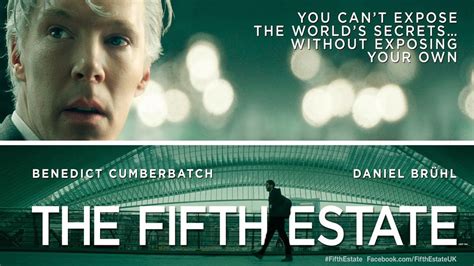
Assange told the Oxford audience that WikiLeaks had also obtained a copy of the script for the $28 million "Fifth Estate" movie, which was being produced by Stephen Spielberg’s Dreamworks studio, based on misleading books by Daniel Domscheit-Berg, David Leigh and Luke Harding (see Chapter Seven).
"It is a mass propaganda attack against WikiLeaks the organisation," Assange said. "But it is not just an attack against us - it is an attack against Iran. It fans the flames to start a war with Iran."
The opening scene was set inside a fake Iranian military complex with nuclear warning signs, even though US intelligence agencies had confirmed Iran didn’t have a nuclear weapons program. Assange noted that the evening’s award winner, Tom Fingar, had overseen the 2007 National Intelligence Estimate (NIE) on Iran, which concluded with “high confidence” that Iran had halted its nuclear weapon work in 2003. That NIE was approved by all 16 US intelligence agencies and had been revalidated every year since by the USA’s Director of National Intelligence.
"They tried to frame Iran as having an active nuclear weapons program," Assange said. "Then they try to frame WikiLeaks as the reason why that’s not known to the public now."

The Oxford Union later refused to release the recorded video of Assange’s speech, claiming copyright concerns about Collateral Murder footage. After WikiLeaks supporters protested, Oxford Union uploaded the video, but only after replacing the Collateral Murder footage with the Union’s logo.
Birgitta Jónsdóttir, who was portrayed by an actor in the film, later said the film’s original title "The Man Who Sold the World" had been changed and the opening scene had been cut. She urged WikiLeaks to be more "constructive". WikiLeaks accused her of selling out.
"The Fifth Estate" premiered at the Toronto International Film Festival in September 2013 and was first released in US theaters on October 18, 2013. It was the biggest box office flop of the year, grossing only $6 million, leaving Dreamworks with a loss of around $22 million. Critics slammed it but Alan Rusbridger, who was reverentially portrayed in the film, praised lead star Benedict Cumberbatch’s "stunning' portrayal of Assange:
"The voice and the slightly jerky, stiff, awkward demeanour are just right."
Interestingly, UK Prime Minister David Cameron made the very same observation when - in another bizarre twist - he was shown an early preview of the movie. Assange’s closest friends said the protrayal was totally wrong, laughing out loud at the error-ridden distortions of the script, and dismissing the movie as "complete bullshit".
It was later revealed that Cumberbatch had secretly been in email communication with Assange during the making of the film, and tried to get improvements to the script. While he declined Assange’s advice to drop out of the movie, he said the WikiLeaks founder was "a true force to be reckoned with", and had achieved the realization of a great ideal.
*
Mediastan
Meanwhile Julian Assange (being "constructive") had helped produce a more realistic WikiLeaks movie: Mediastan follows a team of WikiLeaks staff traveling through Central Asia in 2011, searching for local media partners who are willing to publish politically sensitive Cablegate material.
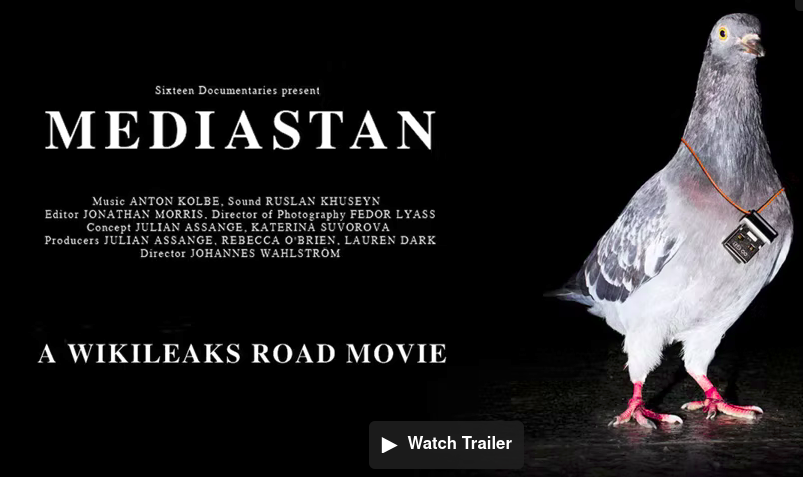
In MEDIASTAN, an undercover team of journalists drives across the central Asian republics of Kazakhstan, Kyrgyzstan, Tajikistan, Turkmenistan, Uzbekistan and into US occupied Afghanistan, before continuing its journey into the west; regrouping in Julian Assange’s kitchen, ambushing the editor of the Guardian, and obtaining candid footage of the New York Times editor and its publisher Arthur Sulzberger speaking about Obama.
The film examines how media censorship and self-censorship vary around the world. It was released for free and deliberately timed to offer an alternative to Spielberg’s Hollywood competition. Ironically, the global publicity for "The Fifth Estate" helped boost interest in "Mediastan", which by certain metrics appeared to be far more popular.
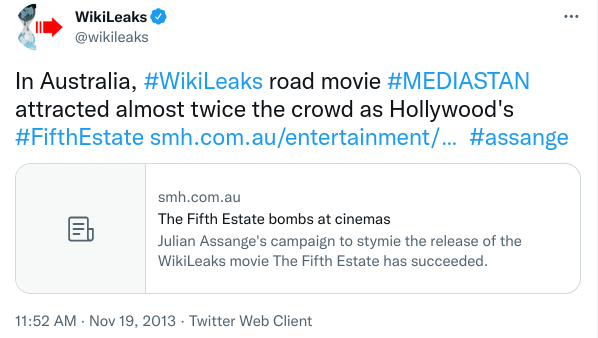
Meanwhile, two other movies were still in the works. Film-maker Laura Poitras had been given inside access to the WikiLeaks team since 2010, and was hoping to release her movie "RISK" soon. But in early 2013 she was contacted by Edward Snowden, who had given up trying to get Glenn Greenwald to install PGP software. Ironically, she then contacted Greenwald to ask for his assistance, and he quickly realised that her source was the "Cincinnatus" guy he had been fobbing off for months. It soon became obvious that Poitras would need to make yet another movie.
*
WikiLeaks Party
On 12 December 2012 Julian Assange announced the formation of the WikiLeaks Party and confirmed that he would run as a candidate for the Australian Senate at the 2013 Australian federal election. His father John Shipton had already spent many months discussing this move with lawyers, planning how to formally establish the new political party, and quietly building a network of dedicated WikiLeaks supporters to help. The party was formally registered on 2 July 2013 with over 1,300 fee-paying members.
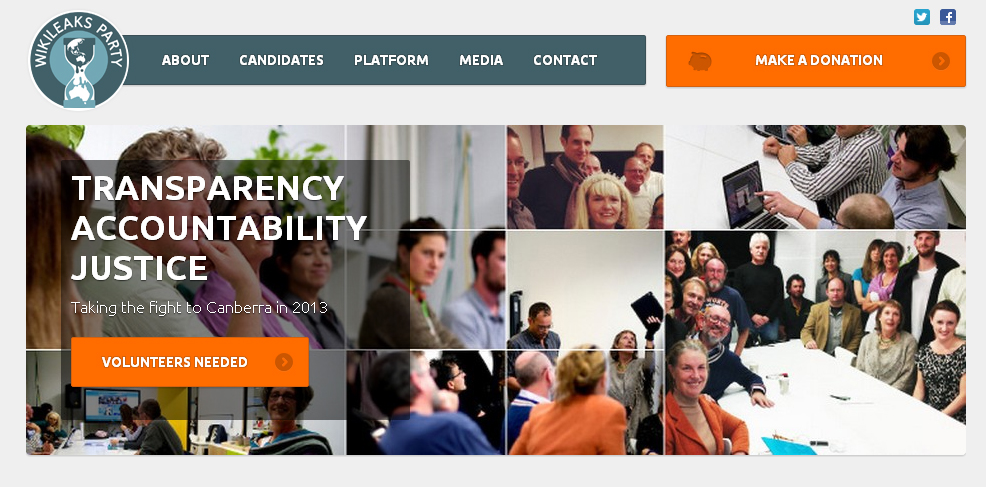
The new party was met with much popular enthusiasm and global media interest. Election monitors confirmed that Assange would be eligible to run as a candidate, even though he was detained in the Ecuadorian embassy in London, and despite his on-going legal problems with Sweden. Others suggested that he could face a legal challenge if he did win a seat, as seemed quite possible. Supporters outside Australia discussed setting up their own versions of the party to help advocate for the WikiLeaks ideals of transparency and open government, which were the new party’s policy cornerstones.
The WikiLeaks Party helped boost media interest, giving Julian Assange an opportunity to do interviews and publish articles about Australia’s lack of sovereignty and his own lack of government suppport. But Assange was also busy dealing with many other urgent issues in 2013 (for example, Sarah Harrison had to fly out of Australia in early June to help Edward Snowden). As the election loomed closer, the WikiLeaks founder’s failure to communicate closely with members of his own party’s National Council gradually lead to "simmering tensions" within the party.
The Australian Senate uses a complex preferential voting system, where voters can either nominate all candidates in order of preference, or just vote for a single candidate, which then allows that party’s previously declared list of preferences to dictate where that vote goes next (assuming the chosen candidate does not win outright victory). This has lead to some very odd and confusing back-room deals between political parties, particularly "micro" parties seeking to exploit the system for their own benefit.
When it came time for the WikiLeaks Party to declare their own list of preferences, a major schism quickly became apparent. On the one hand, John Shipton and other party leaders wanted to make cynical deals with unpalatable far right parties in order to maximize their chances of success. But most of the party’s senior National Council members wanted to either support like-minded parties, such as the Greens or the Pirate Party, or avoid making preference deals altogether. When party leaders simply ignored the National Council (contravening their own party rules) and submitted their own list of preferences to the Electoral Commission, National Council members including Dan Matthews resigned in protest and supporters around Australia vented their outrage:
Over the next few hours, social media exploded with outrage — in my view, much of it justified. Supporters melted away. Our base evaporated. The view within the party that preferencing the far Right would not lead to any mass outrage, but that average punters couldn’t care less about preferences, was comprehensively demolished by the course of events.
Members resigned en masse. Volunteers and Volunteer coordinators were heartbroken and could not bring themselves to work for the cause to which they had previously devoted themselves selflessly.
In Western Australia, the WikiLeaks Party had preferenced the Nationals ahead of the Greens' Senator Ludlam, who barely managed to hold his seat after a botched recount. In New South Wales, preferences went to the militant Shooters & Fishers Party and the far right Australia First Party.
Party leaders first ignored the outrage, venting their anger on National Council members instead, then claimed an unspecified "administrative error" was to blame for the debacle. Julian Assange did some angry TV and radio interviews that were widely described as "trainwrecks", claiming that he was "not a politician" and his party was "not a vehicle for the Greens". It was already too late. The widespread public perception was that the WikiLeaks Party had set itself up as a champion of lofty ideals but then embraced gutter politics at the first opportunity. The party had also set itself up with a laudable democratic structure, which the executive team had simply ignored when it became inconvenient. Clearly, Julian Assange was NOT a politician.
The 2013 Australian federal election took place on 7 September 2013. After six years of frequently chaotic Labor Party government, Tony Abbott’s Liberal-National Party Coalition won a landslide victory. The WikiLeaks Party won just 0.66 per cent of the national vote and no WikiLeaks Party candidates were elected. Meanwhile, thanks to preference deals, the Christian right Family First Party (with 1.1 percent of first preferences), the Australian Motoring Enthusiast Party (0.51%), and even the Australian Sports Party (0.02%) all managed to win a Senate seat. An historic opportunity for significant change had been squandered.
Full Disclosure: I was invited to become a candidate for the WikiLeaks Party, and was involved in fundraising and organisational work until the preferences debacle. The day after the election, I called for a proper inquiry. Weeks later, the WikiLeaks Party announced a sham "independent review". In March 2014 I posted my own WikiLeaks Party Review.
Despite the election debacle, remaining WikiLeaks Party members hoped to continue with their adventure. Somehow this ended up with John Shipton and other senior party members visiting Syria in December 2013, where they were invited to meet with President Bashar al-Assad. Shipton said the “peace and reconciliation” trip aimed to show “solidarity” with the Syrian people.
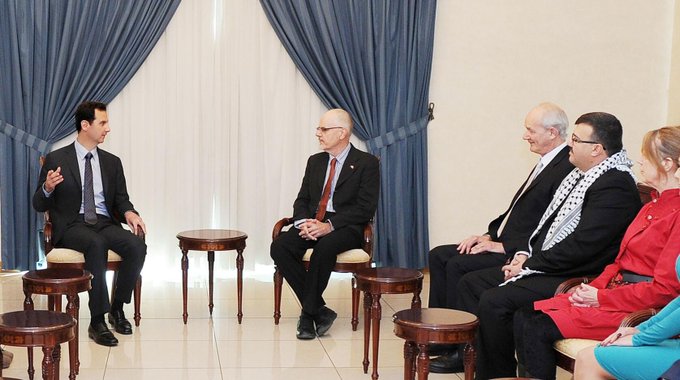
Again, WikiLeaks supporters and critics alike were outraged. Journalist Antony Loewenstein, a vocal WikiLeaks supporter, said the party delegation was "being used as a prop by a regime that has undeniably killed tens of thousands or more civilians.” The Australian government condemned the visit. WikiLeaks was forced to clarify that they neither knew about nor condoned the visit.
The WikiLeaks Party again sought to win a Senate seat in the re-run April 2014 West Australian election, but their lead candidate withdrew for "unforeseen personal reasons" just an hour before the official close of nominations. The WikiLeaks Party was deregistered by the Australian Electoral Commission on 23 July 2015.
*
PlusD Kissinger Cables
In 7 April 2013, WikiLeaks announced the release of "Special Project K", a.k.a the Kissinger Cables. These 1.7 million United States diplomatic cables, dating from 1973 to 1976, were already publicly available at the US National Archives but WikiLeaks released them in searchable format, making research far easier. The US government had increasingly been reclassifying, redacting or censoring the files, so WikiLeaks also preserved them for history.
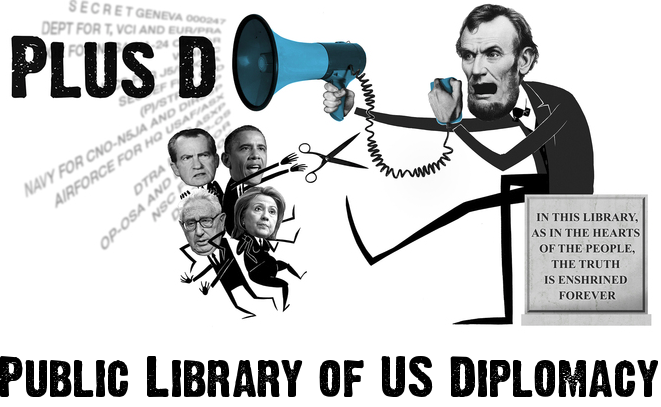
WikiLeaks also merged the Kissinger cables with their previous Cablegate archive (which was only one fifth of the size) to create the WikiLeaks Public Library of US Diplomacy (PlusD), which now boasted 2 million records.
"The collection covers US involvements in, and diplomatic or intelligence reporting on, every country on Earth," said Julian Assange. "It is the single most significant body of geopolitical material ever published."
While the new cables were already in the public domain, media partners managed to find some interesting new stories. For example, the Vatican had dismissed reports of massacres committed by Chilean dictator Augusto Pinochet as "propaganda". And Henry Kissinger’s State Department had doubted that Margaret Thatcher would ever become British Prime Minister because her "immaculate grooming" and "imperious manner" would not appeal to the UK working class. The cables also included Kissinger’s infamous quote:
"The illegal we do immediately; the unconstitutional takes a little longer."
*
Finally, A Financial Win
On 24 April 2013 WikiLeaks announced a major victory in their Banking Blockade battle. Iceland’s Supreme Court had upheld an earlier court decision that Valitor (formerly VISA Iceland) had unlawfully terminated its contract with WikiLeaks' donations processor DataCell.
If the gateway to WikiLeaks donations is not re-opened within 15 days Visa’s Valitor will be fined 800,000 ISK ($6,830) per day.
Julian Assange declared it "a victory for free speech" and "a victory against the rise of economic censorship to crack down against journalists and publishers."
"And we send out a warning to the other companies involved in this blockade: you’re next."
Wikileaks and DataCell had launched their joint case against Valitor in June 2012 but a final settlement was not ultimately agreed until 2019. Iceland’s Grapevine news site reported that Valitor had agreed to "pay the amount previously confirmed by Reykjavík District Court: 1.2 billion ISK, to both DataCell and Sunshine Press Productions, Wikileaks’ publishing company." 1.2 billion Icelandic Kroner was equal to about $10.2 million US dollars, a sizeable win.
At the time, it was still not possible to donate directly to WikiLeaks via credit card. But in December 2012, Assange had worked with press freedom advocates including Daniel Ellsberg, US actor John Cusack, and Electronic Frontier Foundation (EFF) founder John Perry Barlow, to set up the Freedom of the Press Foundation, which was now collecting tax-deductible donations for WikiLeaks and other groups.
Meanwhile London taxpayers were paying over $15,000 per day for round the clock police surveillance of the Ecuadorian embassy. By June 2013 the total cost of police surveillance, not including constant covert surveillance, had already exceeded £4 million. Future UK PM Boris Johnson, who was then the Mayor of London, said it was “absolutely ridiculous, that money should be spent on frontline policing… It’s completely wasted.”
*
Anakata
Gottfrid Svartholm Warg (alias "Anakata") is a co-founder of the hugely successful Pirate Bay file-sharing site, and a co-owner of the Internet service provider PRQ, which originally hosted the Pirate Bay servers in Sweden.
In May 2006, 65 police officers raided the Pirate Bay offices in Stockholm, confiscated servers and forced the site to go down for three days. The raid was motivated by political pressure from the Motion Picture Association of America (MPAA) who declared it a success. But three days later the site was back online with twice as many users. Meanwhile the Swedish police website was forced offline for days in a row.
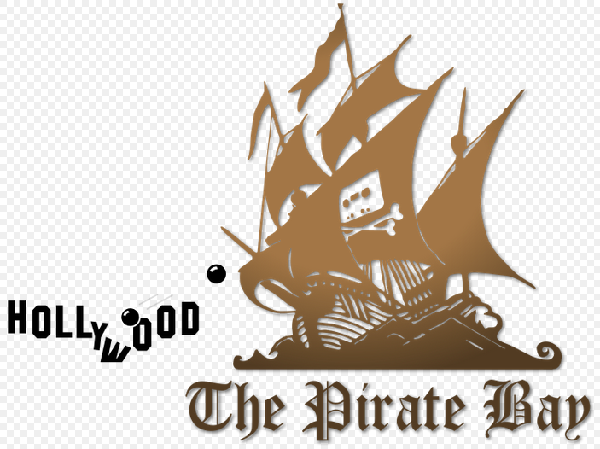
In January 2008, Pirate Bay operators Fredrik Neij, Gottfrid Svartholm, Peter Sunde and Carl Lundström were charged with "promoting other people’s infringements of copyright laws." In April 2009, they were found guilty of "assisting in making copyright content available" but appealed the decision. In October 2009, a Swedish court banned Svartholm from operating the Pirate Bay site, even though he was no longer living in Sweden and the Pirate Bay was no longer based there.
Svartholm was arrested in Cambodia on 30 August 2012 at the request of the Swedish government. His trial began on Monday 20 May 2013 in Stockholm. A day before the trial, WikiLeaks released prosecution and prison documents related to his case. The material was publicly available but Swedish authorities were refusing to provide it in digital format and photocopying such a volume of paper would cost around £350.
WikiLeaks also noted that Svartholm Warg had worked with them for the 2010 release of Collateral Murder:
All those who feature on the Collateral Murder video credits have been subsequently harassed in one way or another, including by having their personal information subpoenad by the US Department of Justice, and through harassment and intimidation by the FBI, who have attempted to turn WikiLeaks associates into informers. This includes, but is not limited to, Jeremie Zimmermann, Kristinn Hrafnsson, Rop Gonggrip, Birgitta Jonsdottir, and Smari McCarthy.
In September 2013 Svartholm was deported from Cambodia to Sweden where he was jailed. He was then extradited to Denmark and held in jail for other alleged offences. He was eventually released in September 2015. Pirate Bay co-founders Neij and Sunde were also released in 2015 after serving shortened sentences. In 2016, rival site KickassTorrents was shut down by the US government, which meant The Pirate Bay was again the world’s most popular BitTorrent website.
*
Trial of Chelsea Manning
The long awaited trial of Chelsea Manning finally began on 3 June 2013, more than three years after she was first arrested, and 986 days longer than the legal maximum. The trial was scheduled to run for 12 to 16 weeks.
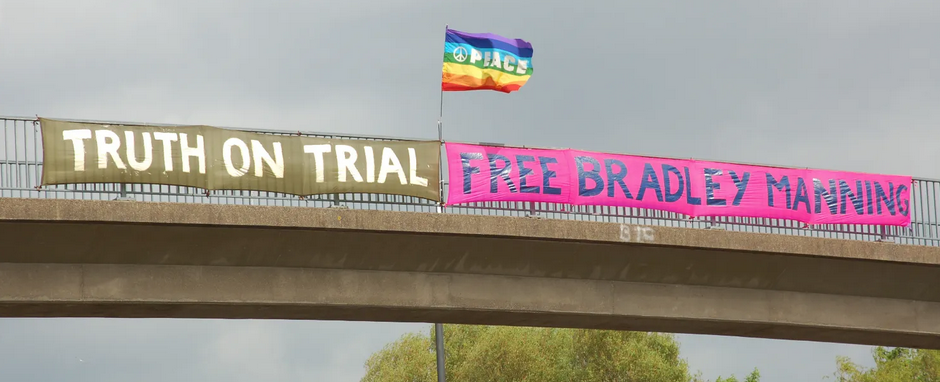
Protests were held around the world. On 1 June over 2,000 protesters gathered outside the military courtroom in Fort Meade, Maryland. Speakers included Pentagon Papers whistle-blower Daniel Ellsberg (below), former political prisoner-turned-human rights advocate Sarah Shourd, LGBT activist and US Army LT Dan Choi, and retired US Army Col. Ann Wright. The Bradley Manning Support Network, which was responsible for 100% of PFC Manning’s legal fees, had by then contributed over $1.25 million dollars in defense costs.
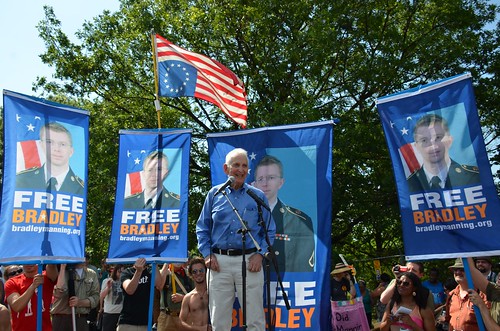
In a lengthy statement, Julian Assange said it was fair to call the process a "show trial" because pretrial hearings had inflicted "pre-emptive bans on every defense argument that had any chance of success".
Bradley Manning may not give evidence as to his stated intent (exposing war crimes and their context), nor may he present any witness or document that shows that no harm resulted from his actions. .. To convict Bradley Manning, it will be necessary for the US government to conceal crucial parts of his trial. Key portions of the trial are to be conducted in secrecy: 24 prosecution witnesses will give secret testimony in closed session, permitting the judge to claim that secret evidence justifies her decision. But closed justice is no justice at all.
In the end it is not Bradley Manning who is on trial. The trial of Bradley Manning ended long ago. The defendant now, and for the next 12 weeks, is the United States and the collapse of its institutions. The runaway military, the deferent courts, the hand-maiden press, and the rotten institutions of government. They sit in the docks. We are called to serve as jurists, during this, their lowest hour. We must not turn away.
Manning had already pleaded guilty to 10 of the 22 charges, but prosecutors were seeking a court martial on the remaining charges. Manning was convicted on July 30, on 17 of the 22 charges in their entirety, including 5 counts of espionage and theft, and amended versions of 4 other charges. Interestingly, she was acquitted of the key charge of "aiding the enemy", which carried a potential death penalty, even though documents showed US officials were now referring to WikiLeaks as "the enemy". US prosecutors at her trial conceded that there was no proof that the information supplied to WikiLeaks by Manning had ever caused harm to anyone.
On 21 August 2013, Chelsea Manning was sentenced to 35 years in prison.
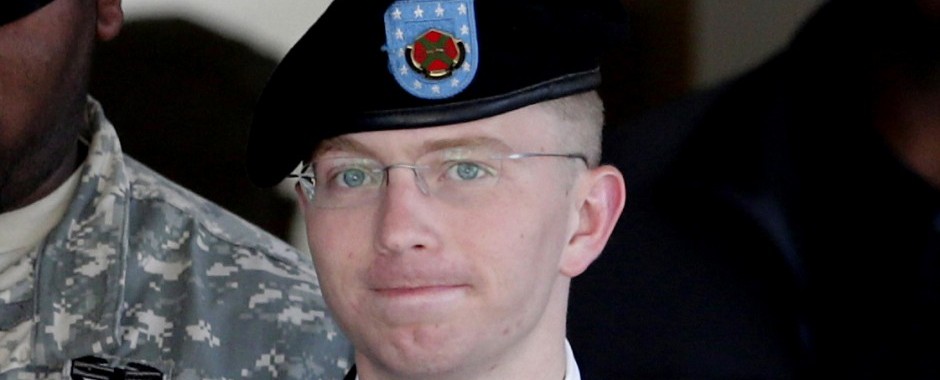
*
The author of this book can be found on Twitter: @Jaraparilla
*
Home - Genesis - 2007 - 2008 - 2009 - Early 2010 - Mid 2010 - Late 2010 - End 2010 - Early 2011 - Mid 2011 - Late 2011 - End 2011 - Early 2012 - Late 2012 - Early 2013- Late 2013 - 2014 - 2015 - Early 2016 - Late 2016 - 2017-19
Copyright Gary Lord 2021, 2022, 2023